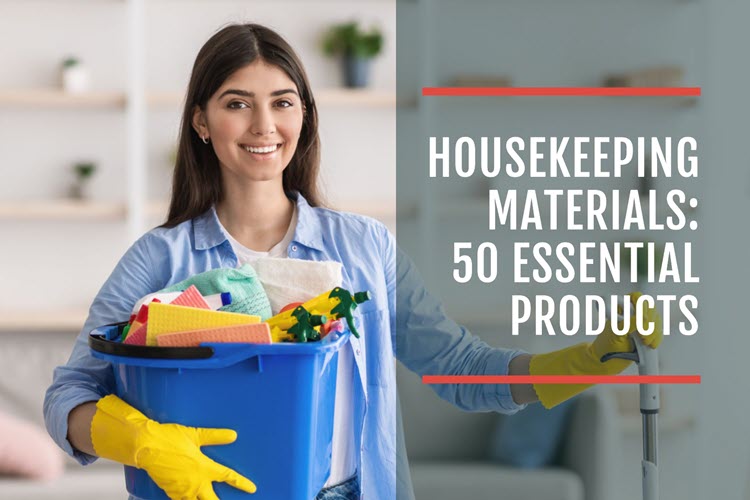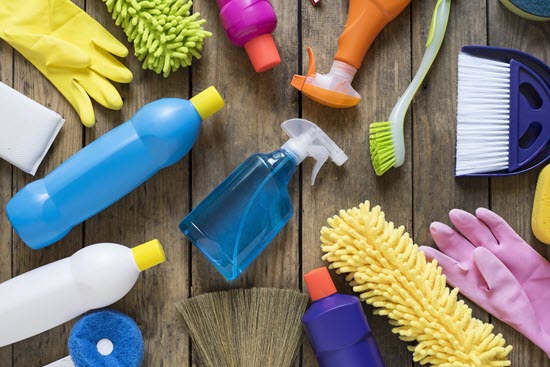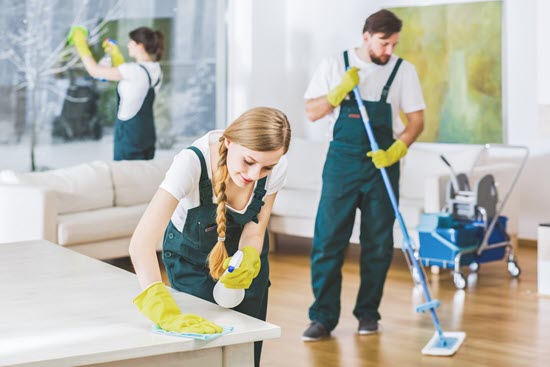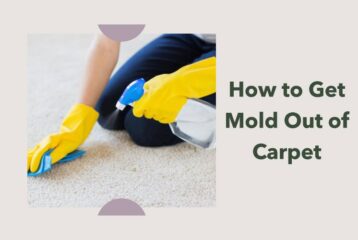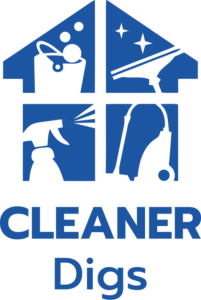When it comes to being a professional cleaner, it’s vital to have the right housekeeping materials. These cleaning products not only help you to keep your client’s homes spotless, but also contribute to a healthier and more comfortable home environment.
You may already have some basic housekeeping materials in your cleaning arsenal, such as:
- A vacuum cleaner
- Feather dusters
- Broom and dustpan
However, there are numerous other housekeeping items and cleaning supplies you should consider purchasing, such as:
- High-quality cleaning chemicals
- Paper products
- Floor care tools
With the right housekeeping materials, cleaning your client’s home becomes much more manageable. As we dive deeper, you’ll learn more about each of these housekeeping materials, making your work as a professional housekeeper smoother and more effective.
In This Article
3 Types of Housekeeping Materials
In this section, we will discuss the different types of housekeeping materials that you should have in your arsenal to make house cleaning as quick and easy as possible. We have divided the materials into three main categories:
- Home Cleaning Products
- Cleaning Tools and Equipment
- Laundry Essentials
1. Home Cleaning Products
When choosing cleaning products, it’s essential to consider the surface you are working on and the type of cleaning agent needed. Common cleaning agents include:
Abrasive Cleaners:
Abrasive cleaners can be dry powders or wet liquid formulations. These cleaners contain minerals like silica, feldspar, calcite, and others that help remove stubborn dirt and stains.
Cleaning Detergents:
Cleaning detergents are used for general cleaning purposes due to their ability to loosen and remove dirt and grease from various surfaces.
Disinfectants:
Cleaning disinfectants are vital for killing bacteria, fungi, and viruses that may be present in homes.
Glass Cleaners:
Glass cleaners are specially formulated to clean glass surfaces without leaving streaks or residue.
For a list of the top-rated carcinogen-free cleaning products, you can refer to this article.
You can also clean windows with newspaper, so make sure to keep some old newspaper handy as well.
2. Cleaning Tools and Equipment
The right tools can make all the difference when it comes to cleaning a home. Here are some essential housekeeping materials that most professional housekeepers use.
- Microfiber cloths, which are gentle enough to clean all surfaces without leaving behind scratches, including stainless steel and glass. Our expert recommendation is HOMEXCEL Microfiber Cleaning Cloths
- A scrub brush with strong bristles and a comfortable handle, ideal for tackling tough messes, such as scrubbing a bathtub or sink.
- Broom and dustpan for sweeping up dirt and debris.
- Mop and bucket for cleaning your floors.
- A vacuum cleaner for removing dust and dirt from carpets, upholstery, and other surfaces.
3. Laundry Essentials
Many housekeepers also are tasked with laundry duties as well. So alongside the cleaning products and equipment, you’ll also need some housekeeping materials for your laundry routine.
These include:
- Laundry detergent or pods, suitable for the type of washing machine you’re using.
- Fabric softener or dryer sheets to give clothes a softer feel and reduce static.
- A stain remover to tackle stubborn stains on clothing.
- Bleach (chlorine or oxygen-based) to remove tough stains or whiten whites, but use it cautiously according to the label instructions.
With these housekeeping materials, you’ll be well-equipped to maintain a clean and organized home for your client.
Proper Storage and Organization
Storage Containers
Choosing the right storage containers for your housekeeping materials is essential. You want to protect them from damage and ensure they are easily accessible.
Consider using:
- Clear plastic bins: These allow you to see the contents without opening the container, helping you locate items quickly.
- Wire or plastic baskets: Great for smaller items, these can be handled with ease and keep your supplies organized.
- Hanging hooks or spring-activated clamps: Ideal for vertically storing brooms, mops, and other long-handled tools, these can be attached to doors or walls where you store your cleaning products and supplies.
Remember to label your containers clearly, making it easier for you and other housekeepers you’re working with to identify what’s inside.
Categorizing Cleaning Materials
By categorizing your housekeeping materials, you can improve the efficiency of your job. Here are some tips to consider:
- Separate hazardous and non-hazardous materials: This will help minimize the risk of accidents and ensure safe handling of potentially dangerous products.
- Group items by function: Keep similar items together, such as cleaning cloths in one container and cleaning solutions in another.
- Designate specific areas for different types of supplies: For example, a shelf for general cleaning products, a cabinet for specialized treatments, and a closet for larger equipment.
Following these guidelines and tips when organizing your professional housekeeping supplies will lead to a much more efficient cleaning routine.
Safety and Usage Guidelines
Cleaning Product Safety
When using housekeeping materials, it’s essential to prioritize safety (yours and your client’s). You should familiarize yourself with the Safety Data Sheets (SDSs) of the cleaning products and chemicals you use. These sheets contain vital information to ensure the safe handling, storage, and disposal of these products.
Here are some general safety guidelines for using housekeeping materials:
- Always read and follow the manufacturer’s instructions for use
- Wear appropriate personal protective equipment (PPE), such as gloves, masks, or goggles, when necessary
- Store cleaning products in a cool, dry place, away from direct sunlight and heat sources
- Keep cleaning products out of reach of children and pets
- Dispose of empty containers and used cleaning materials according to your local waste management regulations
Material Handling
Handling housekeeping materials safely and efficiently is crucial to prevent accidents and maintain a well-organized workplace. Here are some tips for handling materials in your workplace:
- Keep work areas neat and orderly to reduce slip and trip hazards
- When stacking materials, maintain a clearance of at least 18 inches from automatic sprinklers, fire extinguishers, and sprinkler controls, although 24-36 inches is recommended
- Ensure a clearance of 3 feet between piled material and the ceiling; if piles are more than 15 feet high, double the clearance
- Remove waste materials, such as paper and cardboard, from work areas to minimize fire hazards
Implementing proper safety and usage guidelines for housekeeping materials in your workplace will promote a safer and more efficient work environment. Remember to stay informed, follow safety procedures, and handle materials with care.
Eco-Friendly Alternatives
Green Cleaning Products
As you consider housekeeping materials, it’s important to look into eco-friendly alternatives that are both effective and gentle on the environment. Some of the best green cleaning products include:
- Aunt Fannie’s Cleaning Vinegar: This eco-friendly vinegar is useful for various tasks around your home.
- Arm & Hammer Baking Soda Shaker: A gentle cleaner that can be used on a wide range of surfaces.
- Tide Purclean: A plant-based laundry detergent that is gentle on your clothes and great for the environment.
- ECOS Non-Toxic Orange All-Purpose Cleaner: A versatile cleaner that is safe for the environment and highly effective.
- Seventh Generation Glass Cleaner: A top-notch glass cleaner formulated without harmful chemicals.
- Seventh Generation Dish Liquid: An eco-friendly alternative for washing your dishes.
These cleaning products will help reduce the impact on the environment without sacrificing performance in your client home care routine.
Reusable Cleaning Tools
In addition to selecting green cleaning products, there are reusable tools that can help make your day-to-day housekeeping tasks more sustainable.
Some reusable tools to consider include:
- Microfiber cloths: These are highly effective at trapping dust and dirt and can be washed and reused time and time again.
- Bamboo brushes: Opt for brushes made from sustainable materials such as bamboo instead of plastic.
- Washable mop pads: Swap out disposable mop pads for washable ones to reduce waste and save money.
- Reusable scrubbing pads: Purchase scrubbing pads that can be easily cleaned and reused multiple times.
By choosing to use eco-friendly housekeeping materials, you are actively contributing to a cleaner and greener world. Make sure you research and select products that align with your values and effectively meet your client’s home cleaning needs.
Budget-Friendly Options
DIY Cleaning Solutions
Creating your own cleaning solutions from common household items is a great way to save money on housekeeping materials. Here are some simple, eco-friendly, and cost-saving recipes:
- All-purpose cleaner: Mix equal parts of white vinegar and water in a spray bottle. Add a few drops of your favorite essential oil for fragrance. This solution is perfect for cleaning countertops, cabinets, and floors.
- Window cleaner: Combine 2 cups of water, 1/4 cup of white vinegar, and 1/2 teaspoon of dish soap in a spray bottle. This mixture will leave your windows streak-free and shining.
- Baking soda scrub: Mix baking soda and water to create a thick paste. This scrub is perfect for removing tough stains and grime from sinks, bathtubs, and stainless steel appliances.
Cost-Effective Purchasing
Many housekeepers and professional cleaning services purchase housekeeping materials in bulk, or they buy off-brand products can help you save money in the long run.
Here are some tips for cost-effective purchasing:
- Shop in bulk: Buy larger quantities of housekeeping materials at wholesale stores or online retailers. Not only does this save you money per item, but it also cuts down on packaging waste.
- Look for sales and coupons: Keep an eye out for discounts, promotions, or sales on housekeeping materials. Clip coupons or use smartphone apps to find the best deals.
- Consider off-brand products: Experiment with less expensive off-brand cleaning products. Often, they perform just as well as their name-brand counterparts but at a fraction of the cost.
Remember, saving money on housekeeping materials doesn’t mean you have to compromise on the cleanliness or safety. With DIY cleaning solutions and cost-effective purchasing strategies, you can promote a clean and healthy space for your client while staying within your budget.
Complete List of Housekeeping Materials (PDF Download)
Here’s a categorized and comprehensive list of cleaning supplies, tools, and equipment a professional housekeeper should have in their home cleaning arsenal.
To download this complete list as a PDF file, click on “Housekeeping Materials List”
Cleaning Agents
All-Purpose Cleaners:
- Multipurpose cleaner
- Disinfecting wipes
Specialized Cleaners:
- Glass cleaner
- Bathroom cleaner (for tub, shower, toilet)
- Kitchen cleaner (for countertops, appliances)
- Wood polish
- Metal polish
- Oven cleaner
- Mold and mildew remover
- Toilet bowl cleaner
- Drain cleaner
- Spot remover for fabrics/carpet
Floor Care:
- Hardwood floor cleaner
- Tile floor cleaner
- Rug and carpet cleaner and deodorizer
Laundry Products:
- Laundry detergent
- Bleach
- Fabric softener
Dishwashing Products:
- Dish soap
- Dishwashing detergent
Deodorizing Products:
- Air freshener
- Deodorizer
Natural Cleaning Products:
- Vinegar
- Baking soda
- Rubbing alcohol
Cleaning Tools & Equipment
General Tools:
- Cleaning caddy
- Protective gloves
- Apron
- Trash bags
Brushes & Sponges:
- Scrub brushes (various sizes)
- Sponges and scouring pads
- Toilet brush
- Dish brush
Cloths & Towels:
- Microfiber cloths
- Terry cloths
- Paper towels
Mops & Brooms:
- Mop & bucket
- Broom & dustpan
- Vacuum cleaner
- Carpet cleaner (if needed)
Dusters:
- Microfiber dusters
- Feather dusters
- Extendable dusters for high areas
Window Cleaning Tools:
- Squeegee
- Window washing applicator
Waste Management:
- Trash cans
- Recycling bins
- Trash compactor (if needed)
Storage & Organization:
Storage:
- Shelving or storage unit
- Storage containers and boxes
Transport:
- Rolling cart (for large properties)
Maintenance:
- Tool maintenance supplies (like vacuum bags or mop heads)
Remember, some of these tools or cleaning products are optional, and can be included or excluded based on the specific needs of your client or the home you’re cleaning.
Frequently Asked Questions
For example, soft microfiber cloths are gentler on delicate surfaces, while abrasive sponges might be necessary for removing stubborn stains.
Here are some guidelines for storing your cleaning supplies:
- Store cleaning solutions in a cool, dry place, away from direct sunlight or heat sources.
- Keep brooms and mops in a designated, well-ventilated area, preferably hanging, to prevent bacterial growth and maintain their shape.
- Keep microfiber cloths, sponges, and gloves clean and dry between uses to prolong their lifespan and prevent foul odors.
Some examples include:
- Biodegradable cleaning products
- Reusable microfiber cloths instead of disposable wipes
- Mops with washable, removable pads
- Plant-based sponges and scrubbers
These materials promote sustainability and reduce waste, without sacrificing cleaning efficacy.
Final Thoughts on Housekeeping Materials
When selecting your housekeeping materials, it’s essential to prioritize safety and effectiveness. You should choose products that efficiently remove dirt, grime, and stains without harming surfaces or putting anyone’s health at risk.
When using these products, remember to read the instructions carefully and follow proper safety guidelines like wearing gloves and ensuring proper ventilation.
Your housekeeping materials should include an all-purpose cleaner for removing different types of stains from various surfaces. It’s also vital to invest in low-maintenance materials that require minimal specialized equipment or cleaning materials—this helps save time, money, and effort.
Keep in mind that an organized and well-maintained environment not only looks great but also contributes to a safer workplace. Integrating good housekeeping practices, such as proper storage and disposal of waste, will help prevent accidents.
Lastly, remember that housekeeping should be a shared responsibility among every worker at your workplace. Communication and establishing a routine can help maintain a clean and safe environment for everyone.
So, ensure you have the right housekeeping materials on hand and follow best practices to maintain a clean, safe, and organized space.
